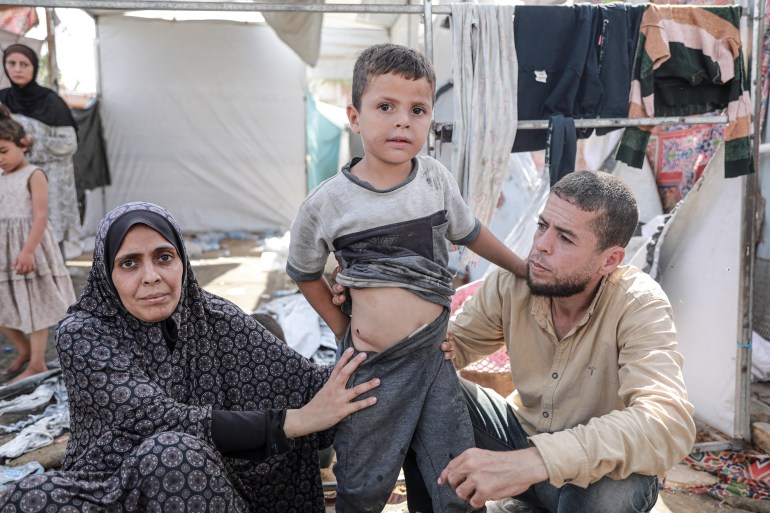‘Our neighbours burned alive’: The bombing of Al-Aqsa Martyrs Hospital

Deir el-Balah, Gaza, Palestine – Amani Madi still can’t believe she and her family survived the bombing that hit Al-Aqsa Martyrs Hospital in the middle of the night.
In the open space where the attack on displaced people’s tents took place early on Monday, the smell of smoke prevails, and burned cans and food are scattered on the ground among charred blankets and clothes.
People wander back and forth. Most of them used to live in the tents, and they are trying to find anything left behind by the blaze that destroyed their flimsy homes.
Bodies on fire as they ran
The attack tore through the makeshift camp set up by displaced people in the hospital’s courtyard, killing at least four people and injuring at least 40.
“It was 1:10am when a massive explosion shook everything,” Madi, a 37-year-old mother of six, recalls as she sits in the remains of her burned tent.
“I looked out and saw flames devouring the tents next to ours,” Madi says. “My husband and I carried the kids and ran towards the emergency building.
“At the entrance, I saw my five-year-old son, who was screaming, was bleeding. I took him to the doctors to discover that he had shrapnel in his stomach.”
The doctors were able to bandage Ahmed up but had to leave the shrapnel where it had hit him, explaining to Madi that it would require delicate surgery to remove, a surgery that is not possible given the badly damaged Gaza medical sector.

Many Palestinians displaced multiple times end up at schools and hospitals, setting up tents again and again, using whatever materials they can find, clustering close together due to a lack of space.
Israel’s bombs spread fire through the crowded tents within minutes as Civil Defence workers struggled to put it out with what limited capabilities they had.
“People – women, men and children – were running away from the spreading fire, screaming,” Madi says. “Some of them were still burning, their bodies on fire as they ran. Terrifying, horrific, … unbelievable.
“Where are we supposed to go? It’s nearly winter. Is there no one to stop this holocaust against us?”

Madi’s tent was next to Jamalat Wadi’s tent, which was practically at the centre of the bombing.
Wadi, 43, says: “It was a miracle we survived, me and my seven daughters.”
“I woke them up, screaming, as our flaming tent was falling on our heads.
“My neighbour, her son and her husband were burned to death. No one could save them,” she says, crying bitterly.
Like many others, Wadi has been forced to flee numerous times, starting in Shujayea, then to Rafah, Nuseirat and Khan Younis before seeking refuge at Al-Aqsa Hospital.
“Now we’re in the streets again, but I won’t stay here after this. There’s nowhere safe.
“Hospitals and schools are at the forefront of Israeli targeting. What have we done to deserve this?”

‘A leg fell to the ground’
Maha Al-Sarsak, 17, lives in a tent adjacent to the ones that burned. Her family’s tent was not affected, but she witnessed the first moments of the explosion and fire.
Al-Sarsak walks through the carnage left behind by the bombing, crying.
She has been displaced at Al-Aqsa with her family for nine months.
After the hospital grounds were targeted numerous times, she says, she stopped sleeping at night for fear of another Israeli bombing.
“I was awake. What I feared happened … for the seventh time. I heard the strike from the direction of the tents opposite us. I screamed for my mother and my [eight] siblings, and we ran out towards the hospital building.”

“I saw our neighbour Umm Shaaban [Alaa Al-Dalu, 37] completely burned and her body charred along with her son [Shaaban, 20].
“When they were moving the victims from there, I saw a leg fall to the ground,” Al-Sarsak adds as she cries.
“They said the south is safe, but there is no safety. People were burned alive, and we spent a very terrifying night. Every time the hospital is targeted, we’re terrified,” Al-Sarsak says.
“But last night was the most terrifying. The fire ate the tents and people’s bodies in moments. Oh, God, have mercy.”

Source: Aljazeera
Leave a Reply